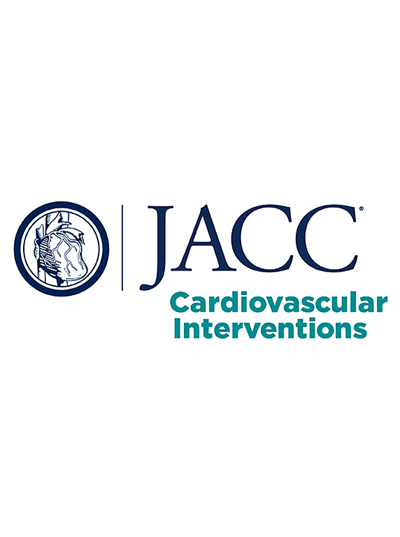二尖瓣前叶撕裂术防止流出道阻塞的 5 年疗效。
IF 11.7
1区 医学
Q1 CARDIAC & CARDIOVASCULAR SYSTEMS
引用次数: 0
摘要
背景:左心室流出道(LVOT)阻塞是经导管二尖瓣置换术(TMVR)的常见并发症,往往是致命的。在美国国家心肺血液研究所的 LAMPOON 试验中,二尖瓣前叶撕裂预防流出道梗阻(LAMPOON)在 30 天内预防 LVOT 梗阻是安全有效的:作者报告了为期 5 年的试验结果:美国国家心肺血液研究所 LAMPOON 试验是一项前瞻性、多中心、单臂的安全性和可行性研究,研究对象为 LAMPOON 和经塞 SAPIEN 3 TMVR 在瓣环成形术(瓣环成形)或原发性二尖瓣环钙化(MAC)(瓣环成形-MAC)中的应用。所有受试者的左心室出口梗阻预测风险都很高。受试者未因过度虚弱或合并症而被排除在外。主要终点是30天后的技术成功率和安全性。次要临床和超声心动图终点在1年后进行评估,临床随访5年:30 名受试者于 2017 年 6 月至 2018 年 6 月期间入组,MAC 中瓣膜组和环中瓣膜组各占一半。30天时,所有30名受试者的LAMPOON均获得成功,无中风,1人(3%)死亡,1人(3%)左心室静脉中度梗阻。18人(65%)存活1年,7人(25%)存活5年。6人(20%)在第一年因心力衰竭住院。从基线到1年,堪萨斯城心肌病问卷评分提高了24分,6分钟步行距离提高了60米。N-末端前脑钠尿肽无明显变化。一年后,左心室出口梯度仍然很低:结论:尽管存在左心室出口梗阻的风险,LAMPOON仍能进行TMVR。结论:尽管存在左心室出口梗阻的风险,但LAMPOON仍能进行TMVR。LAMPOON没有相关的长期并发症。选择无法手术的患者限制了对TMVR术后长期存活率的评估。(NHLBI DIR LAMPOON 研究:经导管二尖瓣成形术中故意撕裂二尖瓣前叶以防止左室流出道阻塞;NCT03015194)。本文章由计算机程序翻译,如有差异,请以英文原文为准。
5-Year Outcomes of Anterior Mitral Leaflet Laceration to Prevent Outflow Obstruction
Background
Left ventricular outflow tract (LVOT) obstruction is a common, often fatal complication of transcatheter mitral valve replacement (TMVR). Laceration of the anterior mitral leaflet to prevent outflow obstruction (LAMPOON) was safe and effective at preventing LVOT obstruction at 30 days in the National Heart, Lung, and Blood Institute LAMPOON trial.
Objectives
The authors report the 5-year outcomes of intentional anterior mitral leaflet laceration before SAPIEN 3 TMVR, in patients at risk of LVOT obstruction.
Methods
The National Heart, Lung, and Blood Institute LAMPOON trial was a prospective, multicenter, single-arm safety and feasibility study of LAMPOON and transseptal SAPIEN 3 TMVR in annuloplasty rings (valve-in-ring) or native mitral annular calcification (MAC) (valve-in-MAC). All subjects had high predicted risk for LVOT obstruction. Subjects were not excluded for excessive frailty or comorbidity. The primary endpoints were technical success and safety at 30 days. Secondary clinical and echocardiographic endpoints were assessed at 1 year and clinical follow-up at 5 years.
Results
Thirty subjects were enrolled between June 2017 and June 2018, equally between the valve-in-MAC and valve-in-ring arms. At 30 days, LAMPOON was successful in all 30 subjects, with no strokes, 1 (3%) death, and 1 (3%) moderate LVOT obstruction. Eighteen (65%) survived to 1 year, and 7 (25%) survived to 5 years. Six (20%) were hospitalized for heart failure in the first year. From baseline to 1 year, there was a 24-point improvement in Kansas City Cardiomyopathy Questionnaire score and a 60-m improvement in 6-minute walk distance. There was no significant change in N-terminal pro–brain natriuretic peptide. At 1 year, LVOT gradients remained low.
Conclusions
LAMPOON enabled TMVR despite the risk for LVOT obstruction. There were no long-term complications associated with LAMPOON. The selection of inoperable patients limited assessment of long-term survival following TMVR. (NHLBI DIR LAMPOON Study: Intentional Laceration of the Anterior Mitral Leaflet to Prevent Left Ventricular Outflow Tract Obstruction During Transcatheter Mitral Valve Implantation; NCT03015194)
求助全文
通过发布文献求助,成功后即可免费获取论文全文。
去求助
来源期刊

JACC. Cardiovascular interventions
CARDIAC & CARDIOVASCULAR SYSTEMS-
CiteScore
11.60
自引率
8.80%
发文量
756
审稿时长
4-8 weeks
期刊介绍:
JACC: Cardiovascular Interventions is a specialist journal launched by the Journal of the American College of Cardiology (JACC). It covers the entire field of interventional cardiovascular medicine, including cardiac, peripheral, and cerebrovascular interventions. The journal publishes studies that will impact the practice of interventional cardiovascular medicine, including clinical trials, experimental studies, and in-depth discussions by respected experts. To enhance visual understanding, the journal is published both in print and electronically, utilizing the latest technologies.
 求助内容:
求助内容: 应助结果提醒方式:
应助结果提醒方式:


